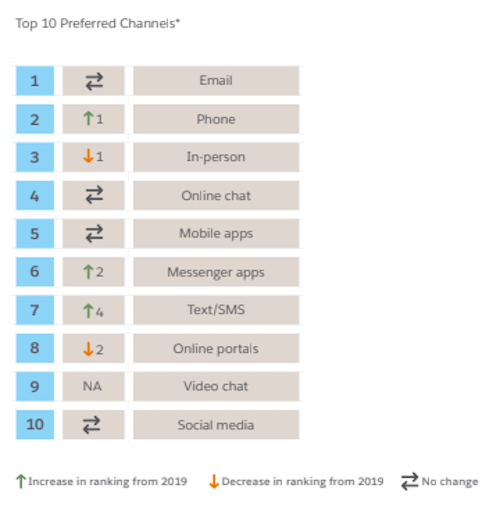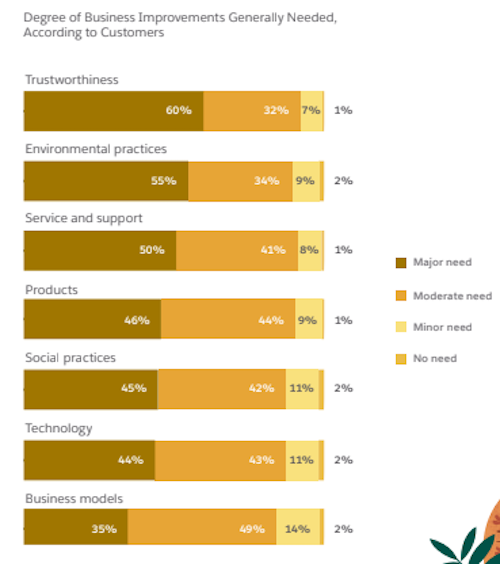Making emotional connections with customers has never been more important. In a changing world where uncertainty underpins business decision making — at least for now, we want to help.
We surveyed over 15,000 customers across the world for the Salesforce State of the Connected Customer report (4th edition). In the report, we analysed how expectations have changed in light of the global crisis. We also found that the need to build emotional connections with your customers is stronger than ever.
Businesses must work harder to increase trust with both existing and new customers. The new normal might be unknown, but why not look at it as an opportunity to:
- Rethink engagement tactics
- Drive sales growth
- Build stronger connections with customers
According to our report, 89% of customers agree that how a company acts during a crisis reveals its trustworthiness. A majority of consumers also expect companies to clearly state their values. The ethics of a company has never been more emotioanlly important to customers than it is now.
Here are 10 tips for getting it right.
1. Focus on customer experience
We discovered that 80% of those surveyed for the report said that the experience they have with a company is just as important as its products and services. So make sure your customer service tools are powerful and effective. This is the first step in ensuring you’re building emotional connections with your customer base.
In this day and age, a customer’s experience is mainly evaluated and based on their online experience. An astounding 89% of customers expect companies to accelerate digital initiatives due to COVID-19. So what happens to businesses that can’t keep up with this digital imperative?
2. Offer new ways to get existing products and services
Think about the way you do business. Has it changed in light of COVID-19? Well, if you’re like the majority of business owners and buyers worldwide, the short answer is yes.
Experiences that were traditionally in person, like sales meetings, have had to move to digital platforms. So now businesses are left with the challenge of trying to make emotional connections with customers online. It's no secret that building emotional connections virtually is a lot more difficult than in-person meetings.
The internet has become such an integral part of life, that a vast majority of consumers actually demand digital-first convenience. According to our report, 71% of consumers agree that convenience is more important than a company’s brand and product (41%).
So in times of crisis, creating online platforms for your customers to find your products and/or service is vital. It also has the added benefit of reducing physical contact, demonstrating that you care about the safety of your customers. When you show that you care about a customer's safety, it's easier to make an emotional connection with them.
3. Expand customer engagement methods
This is particularly important for younger generations. We found that 61% of both Gen Zers and Millennials think companies should expand their customer engagement methods in response to COVID-19. A lower percentage; 55% of Gen Xers and 45% of Baby Boomers think the same thing.
We know that now is the peak of digital transformation, so make sure your digital channels are interconnected and up-to-date. Keep in mind, 76% of customers prefer different channels depending on the context.
Here are the top preferred channels of communication:
4. Show willingness to adapt and innovate
You can build emotional connections with your customers by showing you’re thinking about the current situation and interested in digitally innovating your business.
“69% of customers want companies to translate the products and services they’ve enjoyed all along into new formats (namely, digital versions of in-person experiences).”
For instance, many companies that have fabric manufacturing facilities have started making face masks (and selling them online) despite it not being part of their usual output. A quote from Sun Tzu’s The Art of War is apt here, “in the midst of chaos, there is also opportunity”.
5. Demonstrate trustworthiness
Building and maintaining trust is key to strong, emotional connections with customers customers. Thankfully, there are actions you can take to build trustworthy customer relationships.
“90% percent of customers believe companies need to improve their trustworthiness.”
Completing the European Union Privacy Law Basics (GDPR) training is a great way to show customers they can trust you with their data. Cybersecurity is critical in the Digital Age, so make sure your customers know they can safely do business with you online. Trustworthiness is something you should strive for in every aspect of your business.
6. Show concern for the environment
The COVID-19 pandemic has increased widespread concern over environmental impact. The global crisis promoted consumers to become more aware of certain things like air quality and locally-sourced ingredients. In fact, ‘environmental practices’ ranked 2nd, after trustworthiness, for business improvements generally needed:
Consumers are actively looking at how companies treat the environment as a component of their buying decision. This is a great way to emotionally connect with your customers about an environmental cause and give back to the global community.
7. Be a socially responsible business
It’s good practice to reassure your customers that you have higher priorities than simply generating a profit. Businesses can do this by utilising their resources to create a positive social impact, such as:
- Supporting NGOs
- Donating to a social cause
- Investing in local small businesses
You can also go the extra mile to take care of your employees. If possible, try to give them something to enhance their personal wellness, like a random day off or a small gift to appreciate their hard work. It's easier for customers to connect with a business emotionally when they know it supports a social cause and takes care of its employees.
8. Offer flexible financial solutions
So many consumers are facing financial struggles in the current climate. Being flexible financially shows you care more about your customer’s well-being than making a profit. It doesn’t necessarily mean having to discount products and services, either.
Think about whether you could offer payment plans or alternative payment options such as Klarna. Finance companies, for instance, could consider reducing or freezing financial penalties for missed/late payments.
9. Show you care about mental wellness
As well as the financial impact, this year has affected mental health for so many people. While some of your customers may be fine, others may need a little extra support and reassurance. Showing you care about metal wellness is one of the strongest ways you can make an emotional connection with your customers.
Customers tend to appreciate companies that ‘check in’ on them after a purchase. This can be with a follow-up email, SMS, or a quick phone call. They may also enjoy small surprises like a customer appreciation discount on new products and services.
10. Don’t let skills gaps impact the customer experience
The new normal has shaken up companies in so many ways. Workforces around the world are rethinking how they do business and are moving toward completely virtual customer experiences.
It’s also essential to make sure your workforce is as confident as possible by reskilling and upskilling employees so they can stay connected to customers while working remotely.
Download the complete State of the Connected Customer report (4th edition) to learn even more valuable information about how you can build emotional connections with your customers.








